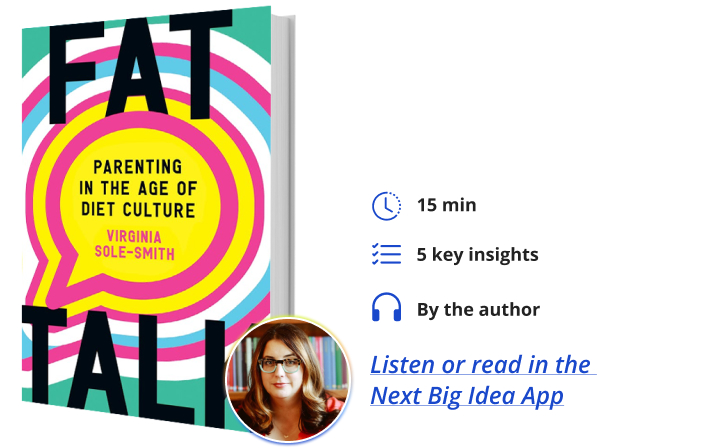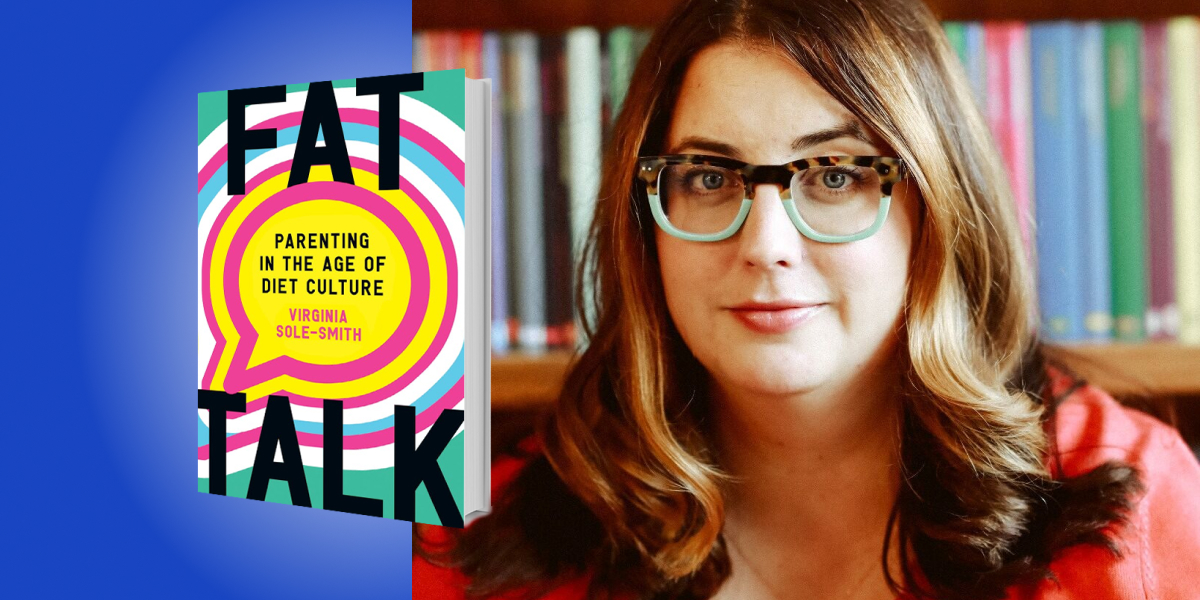Virginia Sole-Smith has been a health journalist for almost 20 years. She reports on diet culture and parenting and has been published in the New York Times and Scientific American. She also writes a newsletter called Burnt Toast and hosts the Burnt Toast Podcast.
Below, Virginia shares 5 key insights from her new book, Fat Talk: Parenting in the Age of Diet Culture. Listen to the audio version—read by Virginia herself—in the Next Big Idea App.

1. Weight isn’t a good predictor of health.
Research on weight and health shows no causal relationship between body size and worse health outcomes. Weight can be a correlating factor, but we don’t really know how much it contributes. Lifestyle habits—how you eat, how often you move, how much you sleep, and how you manage stress—tell us more about a person’s future health risks. However, even they drive health outcomes far less than genetics, or what researchers call “social determinants of health.” These are things like poverty, access to healthcare, access to healthy food, a walkable neighborhood, and experiences of chronic oppression—none of which we, as individuals, have much control over.
We now know that research shows that folks with higher body mass indexes (BMIs) actually tend to live longer than folks with normal or low BMIs. That may be because weight is sometimes protective (higher BMI patients do better with conditions like osteoporosis and cancers and also recover faster from heart surgery) and it may be because weight just doesn’t impact health as much as we think. The real danger to a child, or anyone in a larger body, is how we treat them for having that body. Fat people are less likely to access healthcare, to be treated with dignity and respect by health providers, and to be referred for additional testing or other follow care. Plus, they are less likely to be believed about their own health issues. It sounds counterintuitive, but one of the most important things parents can do to benefit their children’s health is to take weight out of every health-related conversation.
2. Intentional weight loss isn’t healthy or sustainable for the vast majority of people.
Studies show that 80 to 95 percent of people who diet lose some small amount of weight in the first six to nine months. They then gain it all back over the next two to five years, and often with some extra. We don’t “fail” at dieting because we lack discipline or willpower; our bodies are responding exactly the way our bodies are supposed to respond to restriction. Our metabolism slows down, our hunger hormones increase, and we become preoccupied with food. All of this is a feature, not a bug. Our bodies evolved these protective mechanisms to help us survive times of food scarcity, and your body can’t tell if you’re living through a famine or just doing Paleo.
“Childhood dieting, along with weight-based shaming, is a top predictor of future eating disorder risk.”
Even if diets did work, we wouldn’t want kids to diet, but unfortunately, they are. Thirty-eight percent of kids aged 13-16 have tried to lose weight in the past year and 28 percent of kids aged 8-15 have made “persistent attempts” to lose weight. This is concerning because we know that childhood dieting, along with weight-based shaming, is a top predictor of future eating disorder risk. In one important study, teenage girls who dieted “at a severe level” were 18 times more likely to develop eating disorders than those who didn’t. Even moderate dieters, following the kind of lifestyle plan often prescribed by doctors or encouraged by parents, were five times more likely to progress to an eating disorder. Intentional weight loss doesn’t work for most people. It doesn’t improve health markers any more than simply making lifestyle changes or taking medication to treat specific health conditions, but it causes a ton of harm.
3. Idealizing thinness reinforces anti-fat bias.
Researchers began to document this bias with studies in the 1960s, where they showed kids pictures of children with different body types and abilities. They found that children consistently rated the fat body as the one they liked the least. In 2012, researchers revisited the picture-ranking experiment from the 1960s with a group of 415 American fifth and sixth graders and found that anti-fat bias had only intensified. They noted, “The difference in liking between the healthy and obese child was currently 40.8 percent greater than in 1961.” The more we claim to understand and care about the health of fat children, it seems, the less we like them.
The existence of anti-fat bias also begets thin privilege. Thin privilege means never having to worry if you’ll fit in the seat at a restaurant, on an airplane, or in your friend’s dining room. It’s knowing you can eat an ice cream cone in public, or skip a workout, and whatever internal struggle you might feel around these decisions, you will not be judged or ridiculed for the choice by others. It’s the fact that you can shop in any clothing store and be confident that they’ll have your size. You have thin privilege when you mostly see people with bodies roughly like yours (more tanned, and much better dressed, but not worlds apart in size or shape) in a magazine, in a movie, or on social media.
“Thin privilege means never having to worry if you’ll fit in the seat at a restaurant, on an airplane, or in your friend’s dining room.”
Thin privilege, like white privilege and male privilege, is a slippery and often-controversial concept. It can be invisible to anyone who has it, and glaringly obvious to everyone else. That’s because we’re conditioned not to notice any form of discrimination that doesn’t apply directly to us, whether it’s happening around us or we are directly perpetrating it.
4. The most important nutritional need that kids and adults have is getting enough food.
This is true even if you think they don’t get enough protein or if you can’t remember the last time they ate a green vegetable. This is also true even if they fill up on afternoon snacks and eat two bites of dinner or if they consistently measure at the very low or the very high end of your pediatrician’s growth chart. Vegetables are great and protein is great. However, if kids are able to eat enough food to have the energy they need to learn, play, and grow, and barring any serious nutrient deficiencies, allergies, or other medical conditions, parents can generally trust that the details of what they eat will work out.
We don’t need to require broccoli in order to earn dessert and we don’t need to force three kinds of produce into the lunchbox. We can do our job by offering a wide range of nourishing foods, including treats, and let kids be in charge of how much and even whether they eat the food we’re offering. Taking the focus off nutrition is not neglecting your responsibility to nourish your kids. It means you’re honoring and prioritizing the nourishment of your kids as an important aspect of life and well-being, which goes far beyond the nutrient profile of what’s on the plate.
5. We can’t protect our kids from ever encountering diet culture and anti-fat bias.
We can teach them to ask questions and think critically about the messages they get about bodies from the media, school, and peers. We can make fat into just another body descriptor, and we can make fat good. Once we know that to be true, we have no reason to keep pursuing thinness at any cost. We can stop judging how our kids’ bodies grow. We can reject the premise that our worth, as parents or as people, should be measured by our weight. When we do that, diet culture has nothing to feast on; controlling your body size stops being the goal.
“All kids need to know that they are more than their appearance, eating habits, or athletic abilities.”
We can’t keep our kids in diet culture-free bubbles. The goal isn’t to stop Grandma from ever saying a bad word about bread; it’s to help our kids know her bread comment doesn’t apply to them. The goal isn’t to make sure our kids never watch a cartoon with a stereotypical fat villain or a YouTuber on a detox; it’s to teach them to think critically about the media they consume and to call out those instances of harm for what they are. The goal isn’t to raise kids who never experience a moment of body anxiety; it’s to teach kids who to blame when our culture makes them think their body size is their value.
All kids need to know that all bodies are good bodies. All kids need to know that they are more than their appearance, eating habits, or athletic abilities. They need to know that weight isn’t synonymous with health and that neither weight nor health has a moral value. Kids of all sizes deserve to feel in control of their bodies.
They deserve to be able to say whether they are hungry or full or in the mood to try broccoli tonight. They deserve to say if they feel uncomfortable giving Grandma a hug, or with the way their track coach talks about their “runner’s body.” They deserve to opt out of school assignments that teach dieting and to have a doctor who looks at them as a whole person, not as a point on a growth chart. Every kid needs to understand that we live in a fatphobic culture and that we can all work to change that. We can make sure they know that we trust their bodies and that home is their safe space.
To listen to the audio version read by author Virginia Sole-Smith, download the Next Big Idea App today:
































